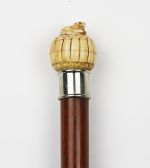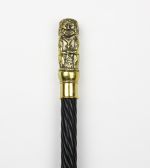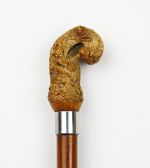The Ambulist
The Ambulist Collection
Sticks and staffs have been with us throughout history and even very early sticks were decorated - the greater beauty to reflect the greater importance of the owner. In writing on pre-history, staffs with carved mammoth ivory or antler horns are mentioned. In Genesis Cain killed his brother Abel with a stick and in The New Testament a stick was for protection - the shepherd's staff later becoming a 'tau cross', then a bishop's 'crosier'.
Pilgrims had sticks some, like later gadget sticks, containing hiding places for money, weapons etc. In ancient Egypt a stick was very important both in life and death, in the tomb of Tutankhamun for instance 132 were found. Portraits of European kings show the monarch's hand resting on a cane, being both a symbol of authority as well as dignity. With the industrialisation of the nineteenth century huge numbers of handles for walking sticks and canes were produced, some designed by the leading designers and silversmiths of the time, including Tiffany in the US.
So, particularly in the eighteenth and nineteenth centuries, walking sticks were part of the customs and style of our ancestors, a fashionable accessory rather than the modern day crutch or support. Being 'worn', rather carried, it was an attractive object with which to swagger, posture or pose.
Today the stick is much sought after by the collector, who is known as an 'Ambulist'.
Sword Sticks
We have a large collection of very fine sword sticks. Sword Sticks or Sword Canes are canes with a hollow shaft containing a concealed blade. Often used to describe European weapons from around 18th century, similar concealed weapons have been used throughout the centuries, for instance the Roman Dolon and the Japanese Shikomizue.Leading sword cutlers made early sword sticks for the nobility. In the sixteenth century sword sticks were often bequeathed in wills and by the 18th and 19th centuries they became a popular fashion accessory for the wealthy.
Restoration & Conservation
Restoration of a stick can be to any degree but our view is that, as they were a very important part of a gentleman's or lady's dress, they would have been kept in an immaculate condition and therefore should be kept as such.
If you have a stick requiring restoration, please contact us by email giving a brief outline together with a telephone number and we will be pleased to call you in order to discuss the matter further. Look out for us at your local shows and we would love to meet you.
Please note: Before making a purchase, please contact us at tel: 01568 760379 or mobile: 07836 278077 - See "Contact us" page



